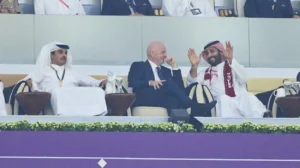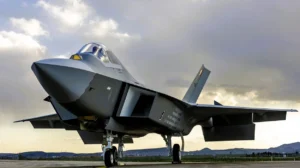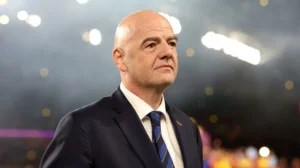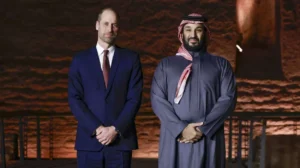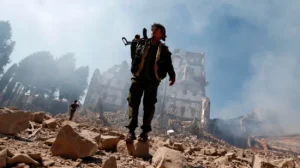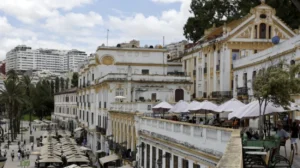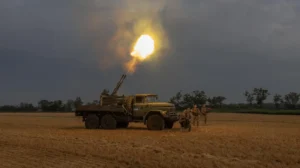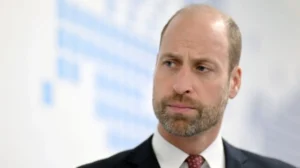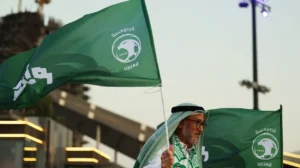- Home
- Why Boycott?
- Human Rights Violations
- Migrant Workers Exploitation & Kafala System Abuse
- Saudi Arabia’s War Crimes
- Freedom of Press and media censorship
- Torture And Unfair Trials
- Saudi Arabia’s Anti-Climate Agenda
- Bogus Stadium Infrastructure
- Sportwashing & Political image
- Saudi Arabia’s Unfair bidding Process
- FIFIA Corruption and Transparency issues
- Poor Treatment of LGBTQ community
- Security risks for spectators
- News
- Get Involved
- Contact Us
Human Rights Violations
The Impact of Human Rights Violations on Saudi Arabia’s UEFA Bid
Saudi Arabia’s bid to host the FIFA World Cup 2034 has become a huge debate. The kingdom has serious ethical issues because of its continuous human rights abuses. However, they are faking great infrastructure projects in efforts to improve their global image. Saudi Arabia’s human rights violations record goes directly against FIFA’s own human rights standards, from labor exploitation to gender inequality, censorship of free speech, and abuse of LGBTQ+ rights. In this article, we will discuss reasons why Saudi Arabia is not fit to host a prestigious event like FIFA World Cup 2034:
1. Widespread Labor Rights Violation
Particularly for World Cup-related building work, Saudi Arabia depends much on migrant labor. Many of the 13.4 million people that constitute about 42% of Saudi Arabia’s population are migrant workers who suffer severe human rights violations under the well-known Kafala system (sponsorship system), which gives employers excessive power over the residence and employment status of their employees.
Key Labor Violations:
- Saudi Arabia’s Human Rights Violations record according to Watch’s 2024 report states that several employees go months without pay.
- Employers regularly hold passports to keep employees from going overseas.
- Many workers typically work 12- to 14-hour shifts at severe temperatures, sometimes without adequate safety.
- The International Labor Organization (ILO) has received several forced labor grievances about the labor system of Saudi Arabia.
World Cup Infrastructure: Case Study
Debt bondage—where recruitment firms charge high fees essentially enslaving workers in cycles of debt—is among the systematic abuses experienced by migrant labor involved with stadium and infrastructure projects, according to Amnesty International’s 2023 inquiry. Saudi Arabian citizen rights are nowhere to be seen.
FIFA’s Hypocrisy on Labor Rights
FIFA has neglected its promises by awarding the 2034 World Cup to Saudi Arabia—where comparable or even more serious abuses endure. Director of Global Initiatives at Human Rights Watch Minky Worden said: “Willfully ignorant to the human rights history of the nation, FIFA is laying the groundwork for a decade of possibly dreadful human rights violations ready for the 2034 World Cup.”
2. The criminalization of free speech and opposition
Regarding freedom of speech and political expression, Saudi Arabia has one of the most restrictive governments on the planet. Using arbitrary arrests, torture, and execution, the government ruthlessly muzzles journalists, advocates, and dissidents. Manal al-Gafiri, an 18-year-old, was sent to jail for 18 years as he supported the political prisoners on his social media.
Punishment for journalists and activists
- Saudi officials have locked up many journalists and campaigners who only criticize the administration.
- Human rights campaigner Lina Alhathloul slammed FIFA’s ruling:
- Based on a flawed bid that overlooked human rights concerns, FIFA gave the World Cup to Saudi Arabia by giving favor to Mohammed bin Salman.
- Believed to be committed by Crown Prince Mohammed bin Salman, journalist Jamal Khashoggi was murdered inside the Saudi consulate in Istanbul in 2018.
Lack of Press Freedom During the World Cup
- International reporters covering politics and sports in Saudi Arabia face imprisonment if they write on human rights abuses.
- Fans and teams voicing political views or criticism could have a serious impact.
According to Amnesty International: “Organizing the World Cup in a land where freedom of speech is prohibited fosters a culture of terror.”
3. Oppression of Women
Though Saudi Arabia has been slowly improving women’s rights, it is still one of the most gender-segregated nations on the planet. Roughly 35% of Saudi women have suffered violence, but institutional problems including the male guardianship system and poor enforcement of domestic violence laws compromise their ability to find justice. It shows how women are treated in Saudi Arabia.
Continuing restrictions on women:
- Under the male guardianship system, women have to ask a male guardian (mother, wife, or son) for various parts of life including travel and marriage.
- women in court have half the value of a man’s testimony.
- For trying to effect change, women’s rights activists have been imprisoned for years, tortured, and even detained.
Dr Maryam Aldossari, a Saudi Activist said: ‘’Previously, women have been used to represent progress whereas those fighting for these rights have been jailed or silenced’’.
Security of Women at the World Cup
- Saudi Arabia’s rigid gender rules will create an unwelcoming setting for women football enthusiasts, players, and reporters.
- There are no stringent rules guarding women against domestic violence or job discrimination; so lack of accountability.
- These considerations seriously challenge Saudi Arabia’s ability to offer female spectators and athletes a relaxing and welcoming atmosphere.
4. Violations of rights for the LGBTQ+ community
Under Sharia law, Saudi Arabia punishes same-sex partnerships from jail times to execution. For LGBTQ+ rights, the nation is among the most awful on the globe.
Main issues for players and fans of LGBTQ+:
- FIFA’s promise of “inclusivity and diversity” means little when LGBTQ+ people are openly discriminated against in Saudi Arabia since there are no LGBTQ+ safeguards. They have 0% tolerance in this case.
- For simply being themselves, LGBTQ+ fans, media members, and athletes run the risk of arrest.
- Silencing of debate: By censoring LGBTQ+ issues, Saudi officials make it impossible to advance inclusiveness.
Amnesty International cautioned against: ‘’The 2034 World Cup will occur in a land where members of the LGBTQ+ community live in fear, therefore flouting FIFA’s ideals’’.
5. FIFA’s part in ‘sports washing’
Saudi Arabia’s World Cup bid is regarded as an effort at “sportwashing“—the use of big athletic events to enhance its world image while distracting from human rights abuses.
- Massive sports investments: Saudi Arabia has spent billions purchasing football teams hosting boxing matches, and introducing LIV Golf.
- Hosting the World Cup brings focus away from human rights abuses and quiets critics.
Worldwide responses to FIFA’s decision
- A joint statement from 21 human rights organizations rejecting the ruling ran
- a great peril for human rights and others
- Adding to Amnesty International’s Head of Economic and Social Legal Steve Cockburn commented: “Reluctantly deciding to give the 2034 World Cup to Saudi Arabia will endanger several lives.”
6. Limited Freedom of Religion
Freedom of religion in Saudi Arabia is very restricted. The 2023 Freedom House assessment shows the country rates 0/4 on religious freedom, meaning severe restrictions. The government strictly interprets Sharia law, punishing apostates and blasphemy. Moreover, with penalties ranging from jail time to death.
Prohibited are non-Muslim religious activities as well as churches and temples not permitted to be constructed; the 2022 International Religious Freedom Report by the US State Department notes that public evangelism is outlawed. Moreover, fringing religious events, the Saudi administration keeps close watch over religious expression, therefore non-Islamists are present in a repressive environment. Accordingly, boycott the Saudi 2034 FIFA World Cup Always!
Statement from Human Rights Watch
“In Saudi, Democratic, the democracy is limited, and this is an issue of fans and reporters and international players in 2034.”
Why Boycott the Saudi 2034 FIFA World Cup?
Saudi Arabia’s use of sportswashing to divert from its repressive policies puts FIFA at a turning point: should it emphasize human rights or rather reward nations for their financial and political leverage? Presenting the World Cup to a country with so many problems sends a bad signal to the world that human rights violations may be disregarded in favor of financial gain. FIFA risks encouraging autocratic governments and weakening the values of fairness, respect, and equality that football is supposed to epitomize.

